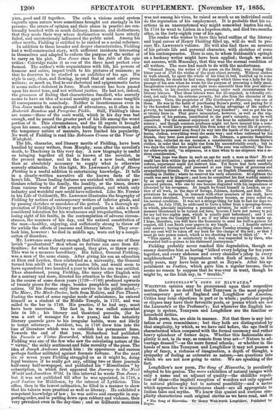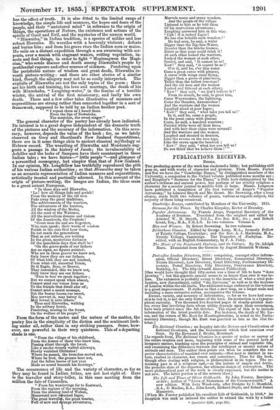LONGFELLOW'S SONG OF IIIA.WATHA.. * WHATEVER opinion may be pronounced upon
their respective merits, there is no doubt but that Tennyson is the most popular contemporary poet of England and Longfellow of America. Critics may raise objections in part or in whole ; particular people or cliques may have their favourite poets, or poems which are not the Laureate's or the Professor's ; but wherever the English lan- guage is spoken, Tennyson and Longfellow are the familiar or household deities.
Both poets, too, are akin in manner. Not that there is any imi- tation or even resemblance; but they both are distinguished by that simplicity, by which, as we have said before, the age itself is characterized when compared with the formal ceremony and rather heavy splendour of former days. Whether this fashionable sim- plicity is not, in its way, as remote from true art—" Nature to ad- vantage dressed"—as the more formal schools; or whether in the hands of men like Tennyson and Longfellow it may not possess a play of fancy' a richness of imagination, a depth of thought, a sympathy of feeling as extensive as nature —are questions into which we are not now going to enter. We are speaking of the fact.
Longfellow's new poem, The Song of Hiawatha, is peculiarly adapted to his genius. The mere exhibition of natural images with only a name and an adjunct of quality—the childlike repeti- tion of ideas—the implicit reception of wonders not only opposed to natural philosophy but to natural possibility—and a metre which approaches to a monotonous chant—are all appropriate to Indian tales and myths. We know this quaint and curious sim- plicity characterizes such original stories as we have read, and it
• The Song of Hiawatha. By Henry Wadsworth Longfellow. Published by Boguc.
has the effect of truth. It is also fitted to the limited range of knowledge, the simple life and manners, the hopes and fears of the people, and their "untutored mind" in reference to the origin of things, the operations of Nature, the existence and actions of the spirits of Good and Evil, and the mysteries of the unseen world. "Hiawatha," in Indian tradition, is a species of milder and less robust Hercules. He wrestles with a heavenly visitant; defeats and buries him; and from his grave rises the Indian corn or maize. He sails on a distant expedition through a sea swarming with ser- pents, over a marsh with stagnant waters, rotting vegetation, in- sects and foul things, in order to fight " Megissogwon the Magi- clan," who sends disease and death among Hiawatha's people by pestilential vapours and other sources of sickness. Pondering upon the perishable nature of wisdom and great deeds, Hiawatha in- vents picture-writing : and there are other stories of a similar kind, though the allegory may not be so easily interpreted. The exploits of Hiawatha are not the only topics of the poem ; there are his birth and training, his love and marriage, the death of his wife Minnehaha, " Laughing-water," in the famine of a terrible winter, the arrival of the first missionary, and lastly his own death. These and a few other tales illustrative of manners and superstitions are strung rather than connected together in a sort of framework, supposed to be told by an Indian brother poet.
" I repeat them as I heard them
From the lips of Nawadaha,
The musician, the sweet Binger." The general character of the poetry has already been indicated. Its interest is to a great degree independent of the dramatic truth of the pictures and the accuracy of the information. On this accu- racy, however, depends the value of the book ; for, as we lately observed on Grey and Shortland's New Zealand Superstitions, there are in it some things akin to ancient classical mythology or Hebrew record. The wrestling of Hiawatha and Moridamin sug- gests a passage in the history of Jacob; the invulnerability of Achilles and the looks of Sampson have their counterpart in these Indian tales ; we have fairies—" little people "—and glimpses of a personified cosmogony, but simpler than that of New Zealand. In our opinion, Mr. Longfellow has truthfully reproduced the pith of his various Indian authorities ; so that _Hiawatha may be taken as an accurate representation of Indian manners and superstitions, artistically treated and poetically adorned. In this account of the origin of picture-writing, the images are Indian, the ideas seem to a great extent European.
" In those days said Hiawatha,. ' Lo ! how all things fade and perIsh! From the memory of the old men Fade away the great traditions, The achievements of the warriors, The adventures of the hunters, All the wisdom of the Medias, All the craft of the Wabenos, All the marvellous dreams and visions Of the Jossakeeds, the Prophets! ' Great men die and are forgotten, Wise men speak ; their words of wisdom Perish in the ears that hear them, Do not reach the generations That as yet unborn, are waiting In the great, mysterious darkness Of the speechless days that shall be ! 'On the grave-posts of our fathers Are no signs, no figures painted; Who are in those graves we know not, Only know they are our fathers. Of what kith they are and kindred, From what old, ancestral Totem, Be it Eagle, Bear, or Beaver,
They descended, this we know not,
Only know they are our fathers. 'Face to face we speak together ; But we cannot speak when absent, Cannot send our voices from us To the friends that dwell afar off; Cannot send a secret message, But the bearer learns our secret, May pervert it, may betray it,
May reveal it unto others.
Thus said Hiawatha, walking In the solitary forest, Pondering, musing in the forest, On the welfare of his people."
From the form of the metre and the natnre of the matter, the poetry lies in the simplicity of the diction and the sentiment flak- ing under all, rather than in any striking passages. Some, how- ever, are powerful in their very quietness. This of a departing shade is one
"From the village of his childhood, From the homes of those who knew him, Passing silent through the forest, Like a smoke-wreath wafted sideways, Slowly vanished Chibiabos ! Where he passed, the branches moved not, Where he trod, the grasses beet not, And the fallen leaves of last year Made no sound beneath his footsteps."
The occurrences of life and the variety of character, so far as they may be found in Indian tribes, are not lost sight of. Here is the traveller and story-teller, in this case meeting from the million the fate of Cassanara.
" From his wanderings far to Eastward, From the regions of the morning, From the shining land of Wabun, r
s
Homeward now urned Iagoo, The great travell , the great boaster, Full of new and range adventures, Marvels many and many wonders.
And the people of the village
Listened to him as he told them
Of his marvellous adventures ; Laughing answered him in this wise :
Ugh! it is indeed Iagoo
No one else beholds such wonders ! '
He had seen, he said, a water
Bigger than the Big-Sea-Water, Broader than the Gitehe Gurnee, Bitter so that none could drink it !
At each other looked the warriors, Looked the women at eaoh other, Smiled, and said, ' It cannot be so!
Raw! ' they said, ' it cannot be so ! ' O'er it, said he, o'er this water Came a great canoe with pinions, A canoe with wings came flying, Bigger than a grove of pine-trees, Taller than the tallest tree-tops! And the old men and the women Looked and tittered at each other ; Kaw ! ' they said, ' we don't believe it !' From its mouth, he said, to greet him, Came Waywassimo, the lightning, Came the thunder, Annemeekee !
And the warriors and the women Laughed aloud at poor Iagoo • K.aw !' they said, ' what tales you tell us!' In it, said he, came a people, In the great canoe with pinions Came, he said, a hundred warriors ; Painted white were all their faces, And with hair their chins were covered!
And the warriors and the women Laughed and shouted in derision, Like the ravens on the tree-tops, Like the crows upon the hemlock ; ' Raw !' they said, what lies you tell us! Do not think that we believe them "



































 Previous page
Previous page